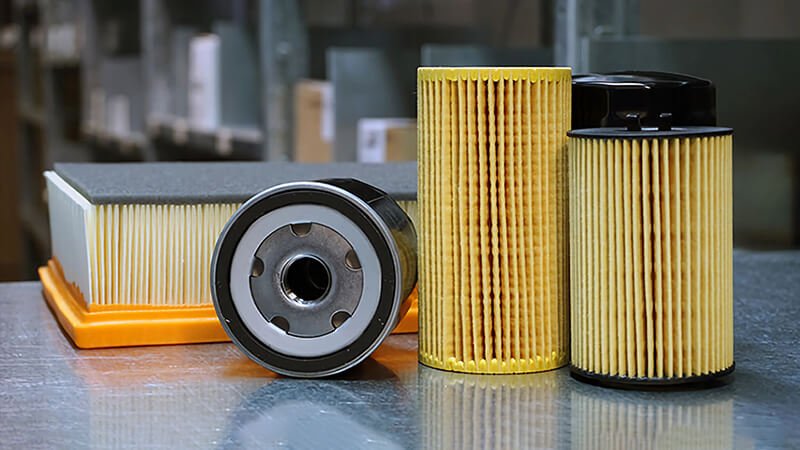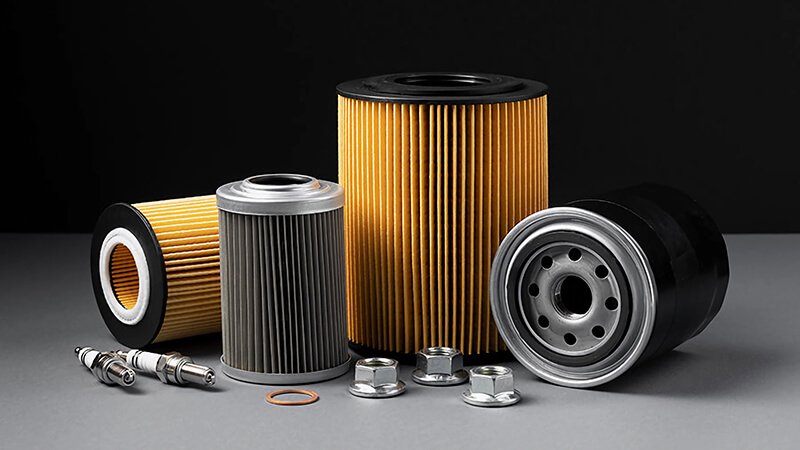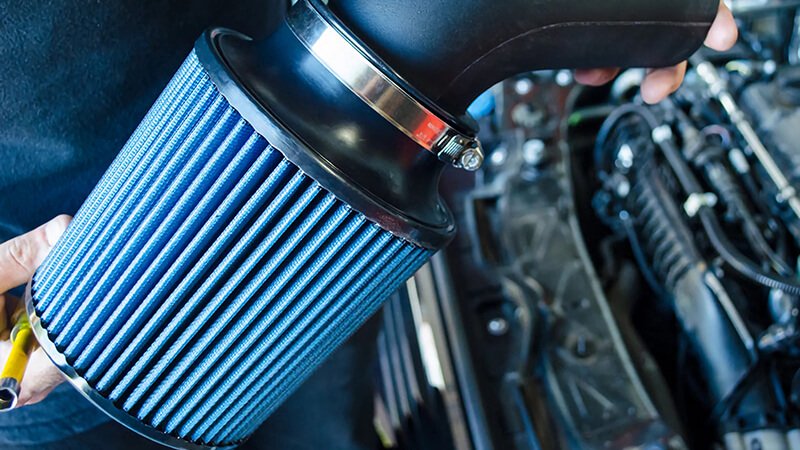Finding a reliable oil filter supplier can be a challenging task for any business. Oil filters are crucial for maintaining engine health and performance, making it essential to partner with a supplier who provides high-quality and durable filters. However, how do you identify the right supplier for your needs?
To ensure that your business gets the best oil filters, you need to evaluate several key factors such as product quality, price, delivery times, and supplier reputation. The right supplier will offer filters that meet the specific needs of your customers while ensuring smooth and efficient service.
In this article, we will dive deeper into the essential factors you need to consider when selecting an oil filter supplier. We’ll also explore common pitfalls, the importance of customer service, and the key certifications you should look for to ensure the reliability of your chosen supplier.

What are the key factors to consider when evaluating an oil filter supplier?
When looking for a reliable oil filter supplier, there are several critical factors to consider. A supplier who meets your business needs can help you maintain smooth operations and provide high-quality products to your customers.
Key factors to consider include the supplier’s product quality1, delivery reliability2, and the range of oil filters3 offered. A supplier with a good track record and the ability to meet your demands will help you avoid potential problems in your supply chain.
When evaluating a potential oil filter supplier, focusing on quality, performance, and consistency is paramount. A high-quality oil filter plays an essential role in vehicle maintenance, ensuring the engine oil is properly filtered and that harmful contaminants do not damage the engine. But how do we evaluate these factors?
Product Quality
The primary consideration is the overall quality of the oil filters. Poor-quality filters can compromise engine performance and result in frequent maintenance needs. Look for filters that use high-quality materials such as synthetic or cellulose fibers. These materials offer better filtration efficiency and durability. Below is a comparison of different filter media:
| Filter Media | Advantages | Disadvantages |
|---|---|---|
| Cellulose | Inexpensive, provides good filtration for basic use | Less durable, requires more frequent replacement |
| Synthetic | Higher durability, better filtration, lasts longer | More expensive than cellulose |
| Microglass | Excellent filtration, good for high-performance engines | Expensive, not always available for all vehicles |
| Blend | Combines synthetic and cellulose, providing a balance of cost and performance | May not offer the same long-term durability as full synthetic |
High-quality filters will also feature a solid casing, which prevents oil leaks, and a well-designed anti-drain back valve to prevent oil from draining back into the engine when the car is off.
Delivery Reliability
Your chosen supplier should have a track record of reliable delivery times. Unexpected delays in shipping can disrupt your operations, potentially leading to stock shortages. It’s important to assess their logistical capacity, especially if your business operates in regions where demand fluctuates. This is where companies with an established distribution network excel.
You can evaluate the delivery reliability by checking reviews or conducting small trial orders to see if the supplier meets delivery deadlines. A reliable supplier will also offer you tracking capabilities and communicate proactively if there are any potential delays.
Price Competitiveness
Cost remains a critical factor, especially when managing a business that relies on bulk orders. However, the lowest price doesn’t always mean the best value. Suppliers who offer competitive prices often balance cost and quality. It’s vital to compare the total value offered, including quality, reliability, and after-sales support. Choosing the cheapest supplier can lead to more frequent issues, which could result in additional repair costs or warranty claims.
Product Range
A comprehensive range of oil filters is crucial, especially if your business caters to a wide variety of vehicles. A supplier offering a diverse range of filters—covering multiple car brands, engine types, and specifications—will provide greater flexibility. You should look for suppliers who specialize in OEM (Original Equipment Manufacturer) quality filters and can provide you with customized solutions if needed.

What are the common pitfalls when choosing an oil filter supplier?
Choosing an oil filter supplier can seem straightforward, but there are several common pitfalls that businesses should avoid to ensure they partner with the right company. Failing to consider these factors can lead to costly mistakes and unnecessary delays in the supply chain.
Common mistakes include choosing a supplier based solely on price4, overlooking product quality5, and failing to check certifications6 or compatibility with specific vehicle models. These issues can result in poor engine performance, customer dissatisfaction, and unnecessary returns.
Choosing the wrong supplier can result in substantial issues down the road. Here are some common pitfalls to avoid when selecting an oil filter supplier:
Focusing Too Much on Price
Price is an important factor, but basing your decision solely on price can be misleading. In many cases, lower prices are associated with lower-quality products. When dealing with automotive components such as oil filters, the risk of compromising on quality can have disastrous effects on engine performance. This could lead to engine damage or frequent maintenance calls, which will ultimately cost your business more in the long run.
A better approach is to look for suppliers that balance price with product quality. While oil filters can be inexpensive, they are critical to ensuring the longevity and smooth operation of engines. Opting for an established supplier with a strong reputation for providing reliable products at reasonable prices will provide the best long-term value.
Not Checking Compatibility
Many oil filter suppliers offer generic filters that may not be compatible with all vehicles. Oil filters are not universal; different engines have different requirements. Failing to check compatibility with specific vehicle models can lead to filters that don’t perform as expected, resulting in poor filtration and potential engine issues.
Before making a purchase, ensure that the supplier provides detailed product specifications. Some companies offer online catalogs that list compatible vehicles by make and model, which can be invaluable in making an informed decision.
Overlooking After-Sales Support
After-sales support is often overlooked, but it’s critical when problems arise with the products you’ve purchased. A supplier who does not provide timely and effective customer service could cost you time, money, and customer satisfaction. Whether it’s replacing defective products or assisting with shipping issues, having a reliable support team behind you is essential.
Make sure to select a supplier who offers clear communication channels, quick responses to inquiries, and solutions for common issues. You should feel confident that any problems will be resolved swiftly to minimize disruption to your business.
Ignoring Certifications and Standards
A supplier who doesn’t meet industry certifications may be selling subpar products. Oil filters must meet specific standards to ensure they perform correctly and provide adequate protection for the engine. Common certifications to look for include:
| Certification | What It Means |
|---|---|
| ISO 9001 | Quality management system standards, ensuring consistent product quality |
| SAE (Society of Automotive Engineers) | Ensures compliance with technical standards for automotive parts |
| OEM (Original Equipment Manufacturer) | Confirms the part is made to the same standards as the original part |
| API (American Petroleum Institute) | Guarantees oil filters meet industry performance standards |
Failure to check these certifications can lead to the purchase of non-compliant filters that could damage vehicles or fail prematurely.

How important is customer service when selecting an oil filter supplier?
While product quality7 is crucial, customer service8 is equally important when selecting an oil filter supplier. A supplier with strong customer service can make a significant difference in your business operations, ensuring smooth communication, timely deliveries, and quick issue resolution.
Good customer service ensures that you have a reliable point of contact to address any concerns. It can also help you resolve problems quickly, avoid delays, and maintain a consistent flow of supplies for your business.
Customer service is essential when evaluating an oil filter supplier, as it plays a vital role in maintaining smooth business operations. A supplier with excellent customer service provides clear communication, handles complaints promptly, and assists in resolving issues related to product quality or delivery.
Timely Problem Resolution9
When issues arise—whether it’s damaged goods, delivery delays, or product defects—how quickly the supplier resolves these issues can have a significant impact on your business. A responsive customer service team will ensure that you don’t experience unnecessary downtime or delays. This is particularly important when you rely on the supplier to provide products on time to avoid stock shortages.
Proactive Communication
A supplier that keeps you updated on your order status, potential delays, or changes in delivery schedules shows that they value your business. Proactive communication prevents misunderstandings and ensures that you are always informed about your order. A reliable supplier will notify you in advance if any issues arise, allowing you to adjust your plans accordingly.
Flexible Support Channels
Customer service should also be easily accessible. Look for a supplier that offers multiple ways to contact their support team, whether it’s by phone, email, or online chat. Some businesses may even offer dedicated account managers who provide personalized support, ensuring that your specific needs are met.
Training and Product Knowledge
A good supplier’s customer service team will have in-depth knowledge of their products, helping you choose the best oil filters for your business needs. They should also be able to offer advice on filter performance, compatibility, and maintenance, giving you the tools to make informed decisions.

Are there any industry certifications or standards to look for in an oil filter supplier?
When choosing an oil filter supplier, it’s essential to look for industry certifications10 and standards11. These certifications ensure that the filters meet the required performance and quality levels, providing peace of mind that your products are reliable and safe for your customers.
Certifications like ISO12, SAE, or OEM standards are key indicators that the supplier’s oil filters are of high quality. These certifications show that the products meet international standards for performance, safety, and durability, ensuring that your customers get reliable filters.
Industry certifications are a clear sign that the oil filters meet established standards for performance and safety. Common certifications include ISO (International Organization for Standardization), which ensures that the supplier’s products comply with international quality management systems, and SAE (Society of Automotive Engineers), which sets standards for automotive parts, including oil filters.
OEM (Original Equipment Manufacturer) standards are also crucial to check for. Oil filters that meet OEM specifications are designed to match the performance of the original filters in vehicles, ensuring compatibility and optimal engine protection. This is especially important for businesses that rely on providing high-quality parts that align with manufacturer recommendations.
By selecting a supplier who offers certified oil filters, you can be confident that the filters will perform as expected, protecting your customers' vehicles and maintaining engine efficiency. These certifications also help build trust with your clients, showing them that you only offer the best products for their needs.
In addition to these certifications, some suppliers may offer additional testing standards that further demonstrate their commitment to quality. For instance, some filters undergo rigorous testing to ensure they can withstand extreme temperatures and pressures, which are common in high-performance vehicles or harsh driving conditions.

Conclusion
In conclusion, selecting a reliable oil filter supplier involves evaluating product quality, customer service, and certifications. Avoiding common pitfalls such as prioritizing price over quality and ensuring compatibility with vehicle models is crucial. By partnering with a supplier who meets industry standards and provides excellent support, you can ensure that your business runs smoothly and your customers receive top-quality products.
If you are looking for your oil filters for OEM supplier13, do not hesitate to reach out to us.
-
To understand the importance of product quality in choosing a reliable oil filter supplier. ↩
-
Learn how reliable delivery impacts the efficiency and success of oil filter supply chains. ↩
-
Gain insights into the variety of oil filters and how it impacts supplier evaluation. ↩
-
To understand why basing decisions solely on price can lead to poor product quality and long-term costs. ↩
-
Learn how product quality in oil filters affects engine performance and operational costs. ↩
-
Gain insight into certifications that ensure oil filters meet necessary standards for optimal engine protection. ↩
-
Understand how product quality influences the choice of oil filter suppliers. ↩
-
Learn how customer service can impact supply chain efficiency and business operations. ↩
-
Discover why swift problem resolution from suppliers is key to maintaining smooth business operations. ↩
-
Learn about key certifications that ensure oil filters meet industry standards for quality and performance. ↩
-
Understand the key standards that oil filters must adhere to for ensuring engine safety and performance. ↩
-
Discover how ISO certification ensures the quality and consistency of oil filters in the market. ↩
-
Explain all details about oil filters of different brand from Runex. ↩













